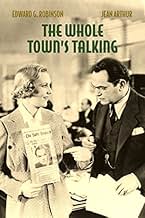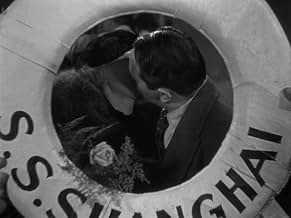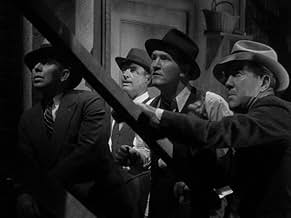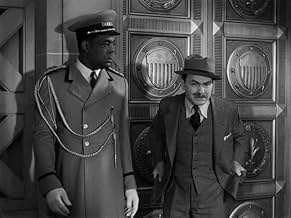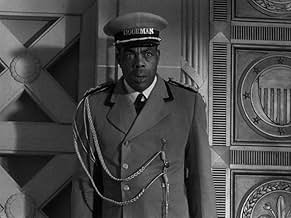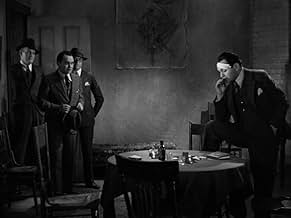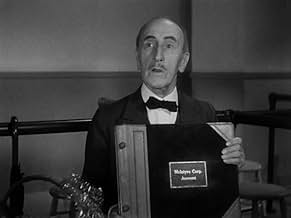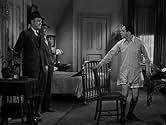VALUTAZIONE IMDb
7,3/10
3580
LA TUA VALUTAZIONE
Aggiungi una trama nella tua linguaA meek milquetoast clerk is mistaken for public enemy N° 1, and the notorious killer takes advantage of the situation.A meek milquetoast clerk is mistaken for public enemy N° 1, and the notorious killer takes advantage of the situation.A meek milquetoast clerk is mistaken for public enemy N° 1, and the notorious killer takes advantage of the situation.
- Regia
- Sceneggiatura
- Star
Harry Abrahams
- Convict
- (non citato nei titoli originali)
Ernie Adams
- Reporter
- (non citato nei titoli originali)
Carmen Andre
- Clerk
- (non citato nei titoli originali)
Chester A. Bachman
- Policeman
- (non citato nei titoli originali)
Eddie Baker
- Policeman
- (non citato nei titoli originali)
Lucille Ball
- Bank Employee
- (non citato nei titoli originali)
H. Barnum
- Undetermined Secondary Role
- (non citato nei titoli originali)
George Barton
- Policeman
- (non citato nei titoli originali)
Recensioni in evidenza
Edward G. Robinson acted two roles in this movie and did a great job with both of them. He played the meek clerk and the tough gangster equally well.
This is a comedy, so one expects a happy ending; still, I couldn't tell how the plot was going to turn to make this work out well. Even ten minutes before the end I was still wondering.
This comedy is very well worth seeing for the acting by Robinson, the great character actors, and Jean Arthur in the role that Katz' Film Encyclopedia says was the first to show that she had comedic range. The film is directed by John Ford, and is rather uncharacteristic of the type of film he usually did.
This is a comedy, so one expects a happy ending; still, I couldn't tell how the plot was going to turn to make this work out well. Even ten minutes before the end I was still wondering.
This comedy is very well worth seeing for the acting by Robinson, the great character actors, and Jean Arthur in the role that Katz' Film Encyclopedia says was the first to show that she had comedic range. The film is directed by John Ford, and is rather uncharacteristic of the type of film he usually did.
Whole Town's Talking, The (1935)
*** (out of 4)
A timid, shy and all around weak store clerk (Edward G. Robinson) gets mistaken for a harden gangster (Robinson) but his new fame allows him to store writing a column in a newspaper about how gangster are weak without their guns. Soon the gangster shows up wanting more than just a little help. As a comedy this movie is a real masterpiece but as a drama, the final thirty-minutes or so really bring down a lot of the great moments. While watching this Columbia movie you can't help but wonder if this was originally meant to be directed by Frank Capra as it has his screenwriters and the small town story certainly seems like something you'd get from a Capra and not someone like Ford. To his credit, Ford does a great job with the comedy and really delivers one of the funniest movies of the 1930's. The problem happens in the third act when it really turns to too much of a gangster film and the laughs are pretty much forgotten. What holds both sides together is the terrific performance by Robinson. The way he plays the timid clerk is just downright hilarious and this includes a masterfully acted interrogation sequence where Robinson is nearly brought to tears because he's so scared. Seeing a tough guy like Robinson acting scared was just hilarious and one actually starts to feel sorry for the guy because it appears he's about to die. Robinson is also great in his second role as the gangster as he's as tough as ever and does manage to come off quite demanding and threatening. Jean Arthur is wonderful as well and adds many great comic scenes including her own interrogation where she keeps admitting to crimes that she has nothing to do with or even knows about. Arthur Hohl, Arthur Byron, Wallace Ford and Donald Meek round out the supporting cast. You can even see Joe Sawyer playing one of Robinson's goons. Again, I didn't care for the final act of the film as the comedy starts to not happen but that doesn't take away from everything at the start of the movie. Robinson has never gotten the credit he deserves as an actual actor, which is a real shame but this film allows for both sides of him to be highlighted and to great effect.
*** (out of 4)
A timid, shy and all around weak store clerk (Edward G. Robinson) gets mistaken for a harden gangster (Robinson) but his new fame allows him to store writing a column in a newspaper about how gangster are weak without their guns. Soon the gangster shows up wanting more than just a little help. As a comedy this movie is a real masterpiece but as a drama, the final thirty-minutes or so really bring down a lot of the great moments. While watching this Columbia movie you can't help but wonder if this was originally meant to be directed by Frank Capra as it has his screenwriters and the small town story certainly seems like something you'd get from a Capra and not someone like Ford. To his credit, Ford does a great job with the comedy and really delivers one of the funniest movies of the 1930's. The problem happens in the third act when it really turns to too much of a gangster film and the laughs are pretty much forgotten. What holds both sides together is the terrific performance by Robinson. The way he plays the timid clerk is just downright hilarious and this includes a masterfully acted interrogation sequence where Robinson is nearly brought to tears because he's so scared. Seeing a tough guy like Robinson acting scared was just hilarious and one actually starts to feel sorry for the guy because it appears he's about to die. Robinson is also great in his second role as the gangster as he's as tough as ever and does manage to come off quite demanding and threatening. Jean Arthur is wonderful as well and adds many great comic scenes including her own interrogation where she keeps admitting to crimes that she has nothing to do with or even knows about. Arthur Hohl, Arthur Byron, Wallace Ford and Donald Meek round out the supporting cast. You can even see Joe Sawyer playing one of Robinson's goons. Again, I didn't care for the final act of the film as the comedy starts to not happen but that doesn't take away from everything at the start of the movie. Robinson has never gotten the credit he deserves as an actual actor, which is a real shame but this film allows for both sides of him to be highlighted and to great effect.
This is an atypical and impersonal Ford film. Given the studio (Columbia Pictures) and the screenwriter (Robert Riskin), this is an ideal stuff for Frank Capra. But it remains without a doubt one of the most enjoyable and pleasurable comedies ever made. It features graceful dynamism and vibrancy that are rare in the Ford oeuvre. It is also one of his fastest movies. It contains what it is probably one of the finest Edward G. Robinson performances I have seen. He is outstanding in the dual role of a mild, working class office clerk Arthur Ferguson Jones who is mistaken for a ruthless mobster Mannion (the role he perfected in "Little Caesar"). And then there is the lovely Jean Arthur as Robinson's coolly self-reliant co-worker, who starts by pitying him and then encourages him, and ultimately falls in love with him. She and Robinson are superb together. It is nowhere near her splendid presence in Mitchell Leisen's "Easy Living" and Frank Borzage's "History Is Made at Night", but this was the sort of role Arthur was to make of her own.
A must-see!
A must-see!
I saw this movie a long time ago as a teenager during a Edward G. Robinson retrospective. It was the one that stuck in my mind, and I never forgot it. Now I have it on videotape and watch it regularly, it stands multiple viewing very well.
The Whole Town's Talking is one of those perfect little movies. Everything falls into place the acting, the pace, the timing of the jokes, the dialog. Even the set design is fabulous, it was basically the big, bright office space in which the good guy Robinson plays slaves" that was unforgettable to me. The movie boasts an assortment of caricature like characters like no other movie I know, beside Robinson I would like to mention Jean Arthur, of course, and the two funny little guys, Donald Meek and, even more memorable, Etienne Girardot as the pedantic office overseer who urges Robinson to get on with the Macintyre account.
In its social comment The Whole Town's Talking reminds me of the work of Preston Sturgess. Mentionable are the media hype about a famous gangster which is really over the top (it's up there with His Girl Friday in this aspect) and the incompetence of the police force which is unable to deal with the gangster and even less with the media and is presented as a helpless and clueless organization. So the movie still has some actuality.
Movie buffs who look at John Ford as an auteur" may be disappointed. The Whole Town's Talking is very much a product of the studio system. But it amply shows what great things that system was able to accomplish at times!
The Whole Town's Talking is one of those perfect little movies. Everything falls into place the acting, the pace, the timing of the jokes, the dialog. Even the set design is fabulous, it was basically the big, bright office space in which the good guy Robinson plays slaves" that was unforgettable to me. The movie boasts an assortment of caricature like characters like no other movie I know, beside Robinson I would like to mention Jean Arthur, of course, and the two funny little guys, Donald Meek and, even more memorable, Etienne Girardot as the pedantic office overseer who urges Robinson to get on with the Macintyre account.
In its social comment The Whole Town's Talking reminds me of the work of Preston Sturgess. Mentionable are the media hype about a famous gangster which is really over the top (it's up there with His Girl Friday in this aspect) and the incompetence of the police force which is unable to deal with the gangster and even less with the media and is presented as a helpless and clueless organization. So the movie still has some actuality.
Movie buffs who look at John Ford as an auteur" may be disappointed. The Whole Town's Talking is very much a product of the studio system. But it amply shows what great things that system was able to accomplish at times!
I don't think there's anyone who's ever seen The Whole Town's Talking and doesn't believe this was a film intended for Frank Capra. The mere fact that the screenplay was co-written by Robert Riskin who won an Oscar together with Capra for It Happened One Night the year before should give ample indication. If Capra had a choice between this and Broadway Bill he chose wrong.
Although this kind of comedy is not usually what is found in John Ford films, Ford does OK by it. I don't think he ever directed again anything that could be remotely classified as screwball comedy.
Edward G. Robinson who would make his second and last appearance in a Ford film 34 years later in Cheyenne Autumn, plays a dual role. He plays Killer Mannion in the tradition he established as Little Caesar and also A.L. Jones a meek, mild mannered clerk a type Robinson would play later in Mr. Winkle Goes to War.
Mannion's escaped from prison and there's a manhunt on for him, similar to the kind that was on for John Dillinger a year earlier. The police will simply shoot to kill. Bad luck for a guy that looks like Mannion and worse luck when Mannion finds out about his doppleganger and tries to make use of him.
Robinson is fine in his dual performance, but the film was a milestone for Jean Arthur who plays Robinson's fellow employee and despite his being a milquetoast, she sees something in him. Up to this point Arthur had played a lot of ingénues and loyal wives to leading men. This is her first role in a screwball type comedy that she became known for, in fact what she's remembered for mostly. Of course a year later, Harry Cohn did team her with Frank Capra and they certainly made some cinematic history.
My favorite two supporting parts are Etienne Girardot as Robinson's officious little office manager and Donald Meek another milquetoast who originally mistakenly turns in the clerk as the gangster and stays on the 'case.'
Though he's not in his element John Ford serves a nice piece of entertainment.
Although this kind of comedy is not usually what is found in John Ford films, Ford does OK by it. I don't think he ever directed again anything that could be remotely classified as screwball comedy.
Edward G. Robinson who would make his second and last appearance in a Ford film 34 years later in Cheyenne Autumn, plays a dual role. He plays Killer Mannion in the tradition he established as Little Caesar and also A.L. Jones a meek, mild mannered clerk a type Robinson would play later in Mr. Winkle Goes to War.
Mannion's escaped from prison and there's a manhunt on for him, similar to the kind that was on for John Dillinger a year earlier. The police will simply shoot to kill. Bad luck for a guy that looks like Mannion and worse luck when Mannion finds out about his doppleganger and tries to make use of him.
Robinson is fine in his dual performance, but the film was a milestone for Jean Arthur who plays Robinson's fellow employee and despite his being a milquetoast, she sees something in him. Up to this point Arthur had played a lot of ingénues and loyal wives to leading men. This is her first role in a screwball type comedy that she became known for, in fact what she's remembered for mostly. Of course a year later, Harry Cohn did team her with Frank Capra and they certainly made some cinematic history.
My favorite two supporting parts are Etienne Girardot as Robinson's officious little office manager and Donald Meek another milquetoast who originally mistakenly turns in the clerk as the gangster and stays on the 'case.'
Though he's not in his element John Ford serves a nice piece of entertainment.
Lo sapevi?
- QuizThe $250.00 per week that Jones is to get for writing the article in this 1935 comedy translates to $4,999.23 per week in 2019 dollars.
- BlooperWhen Jonesy leaves his apartment in a rush he forgets to turn off the taps and his tub is (torrentially) overflowing. But when he returns from the police much later in the day there is no water anywhere.
- Citazioni
Arthur Ferguson Jones: You know something, a woman is only a woman, but a good cigar is a smoke.
- ConnessioniEdited into Michael Jackson's This Is It (2009)
I più visti
Accedi per valutare e creare un elenco di titoli salvati per ottenere consigli personalizzati
- How long is The Whole Town's Talking?Powered by Alexa
Dettagli
- Data di uscita
- Paese di origine
- Lingua
- Celebre anche come
- The Whole Town's Talking
- Luoghi delle riprese
- Azienda produttrice
- Vedi altri crediti dell’azienda su IMDbPro
- Tempo di esecuzione1 ora 33 minuti
- Colore
- Proporzioni
- 1.37 : 1
Contribuisci a questa pagina
Suggerisci una modifica o aggiungi i contenuti mancanti

Divario superiore
By what name was Tutta la città ne parla (1935) officially released in India in English?
Rispondi

